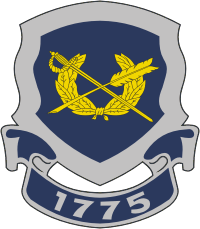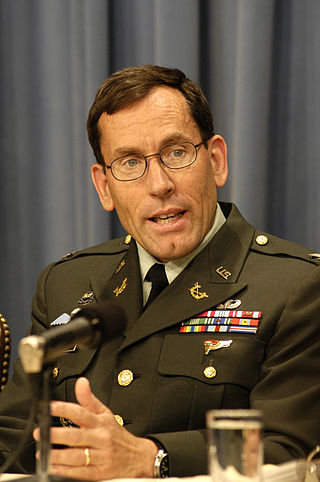Related Research Articles
In the United Kingdom, the Judge Advocate General and Judge Martial of all the Forces is a judge responsible for the court-martial process within the Royal Navy, British Army and Royal Air Force. As such the post has existed since 2008; prior to this date the Judge Advocate General's authority related to the Army and the RAF while the Judge Advocate of the Fleet was the equivalent with regard to the Royal Navy.

The Judge Advocate General's Corps, also known as the "JAG Corps" or "JAG", is the legal arm of the United States Navy. Today, the corps consists of a worldwide organization of more than 730 commissioned officers serving as judge advocates, 30 limited duty officers (law), 500 enlisted members and nearly 275 civilian personnel, all serving under the direction of the Judge Advocate General of the Navy.

The Judge Advocate General's Corps also known as the "JAG Corps" or "JAG" is the legal arm of the United States Air Force.

The Judge Advocate General's Corps of the United States Army, also known as the U.S. Army JAG Corps, is the legal arm of the United States Army. It is composed of Army officers who are also lawyers and who provide legal services to the Army at all levels of command, and also includes legal administrator warrant officers, paralegal noncommissioned officers and junior enlisted personnel, and civilian employees.

Colonel Frederic L. Borch is a career United States Army attorney with a master's degree in national security studies, who served as chief prosecutor of the Guantanamo military commissions. He resigned his commission in August 2005 after three prosecutors complained that he had rigged the system against providing due process to defendants. He was replaced by Robert L. Swann
The United States Marine Corps' Judge Advocate Division serves both to advise the Commandant of the Marine Corps (CMC) and other officials in Headquarters, Marine Corps on legal matters, and to oversee the Marine Corps legal community. The head of the Judge Advocate Division (JAD) is the Staff Judge Advocate to the Commandant.

The Judge Advocate General of the Navy (JAG) is the highest-ranking uniformed lawyer in the United States Department of the Navy. The Judge Advocate General is the principal advisor to the Secretary of the Navy and the Chief of Naval Operations on legal matters pertaining to the Navy. The Judge Advocate General also performs other duties prescribed to them under 10 U.S.C. § 5148 and those prescribed under the Uniform Code of Military Justice.

Michael Chapman is an American lawyer, and former senior officer in the United States Army's Judge Advocate General corps, who was appointed the legal adviser to the Office of Military Commissions, in Guantanamo on September 19, 2008. According to the official press release that announced his appointment his previous appointments included being:

The Naval Justice School (NJS) is an educational institution of the United States Navy whose mission is to instruct Navy, Marine Corps, and Coast Guard officers and enlisted personnel in the fundamental principles of military justice, civil and administrative law, and procedure. In addition to being licensed attorneys in any state or territory of the U.S., all attorneys in the Judge Advocate General's Corps must undergo training either in this institution, or in the complementary institutions of the United States Army and the United States Air Force, allowing them to act as trial or defense counsel at military courts-martial.

Jack L. Rives is a former American military officer and the current executive director and chief operating officer of the American Bar Association, and a former TJAG of the United States Air Force Judge Advocate General's Corps. In 2008, he became the first Judge Advocate General in any service to hold the rank of lieutenant general. He served in the U.S. Air Force from 1977 until 2010.
The Judge Advocate General Branch of the Pakistan Armed Forces is composed of Pakistan's Military senior officers, lawyers and judges who provide legal services to the Army, Air Force, Navy, and Marines at all levels of command. JAG branch comes directly under the Law Directorate of the army. The Judge Advocate General's Legal Service includes judge advocates, warrant officers, paralegal noncommissioned officers and junior enlisted personnel, and civilian employees. In Pakistan, the Judge Advocate General can have the rank of Lieutenant-General, Major or Brigadier-General. The JAG is currently led by the combined Pakistan Armed Forces's senior-rank officers that includes the Vice Admirals of the Navy, Air Marshals of the Air Force, and the Lieutenant-Generals of the Army whose names are kept highly classified.
The Judge Advocate General (JAG) is the Chief of the combined Legal and Judicial system of the three Armed Forces in Sri Lanka. Holds full authority over all legal and Judicial matters concerning the Army, Navy and the Air Force of Sri Lanka. The authority to appoint the "Judge Advocate General" (JAG) is exclusively vested with the Head of State, the President of the Democratic Socialist Republic of Sri Lanka.
The Judge Advocate General's Corps, also known as JAG or JAG Corps, is the military justice branch or specialty of the United States Air Force, Army, Coast Guard, Marine Corps, and Navy. Officers serving in the JAG Corps are typically called judge advocates.
Military law literature in India was established in 1930 by General C.H. Harrington out of a perceived necessity in order to avoid potential injustice within and outside of the armed forces. Military law is a body of law which governs how a member of the armed forces may behave, and as with all forms of law it is subject to periodic changes. The field is based upon official Acts of the Indian government, plus a number of unofficial writings on theoretical applications of law and how it may be changed.

The National Judicial Appointments Commission (NJAC) was a proposed body which would have been responsible for the recruitment, appointment and transfer of judicial officers, legal officers and legal employees under the government of India and in all state governments of India. The commission was established by amending the Constitution of India through the 99th constitution amendment with the Constitution (Ninety-Ninth Amendment) Act, 2014 or 99th Constitutional Amendment Act-2014 passed by the Lok Sabha on 13 August 2014 and by the Rajya Sabha on 14 August 2014. The NJAC would have replaced the collegium system for the appointment of judges as invoked by the Supreme court via judicial fiat by a new system. Along with the Constitution Amendment Act, the National Judicial Appointments Commission Act, 2014, was also passed by the Parliament of India to regulate the functions of the National Judicial Appointments Commission. The NJAC Bill and the Constitutional Amendment Bill, was ratified by 16 of the state legislatures in India, and subsequently assented by the President of India Pranab Mukherjee on 31 December 2014. The NJAC Act and the Constitutional Amendment Act came into force from 13 April 2015.
The Judge Advocate General (JAG) of the Australian Defence Force (ADF) is an office established under the Defence Force Discipline Act (1982). This position is held by a judge or former judge of a federal court or a state supreme court. The appointment of the JAG is made by the Governor-General-in-Council. The JAG has the authority to establish procedural rules for tribunals operating within the Navy, Army, and Air Force. They also conduct the final legal review of proceedings within the ADF and play a role in the appointment of judge advocates, Defence Force magistrates, presidents, and members of courts martial, as well as legal officers for various purposes. Additionally, the JAG is responsible for reporting on the operation of laws concerning the discipline of the ADF.
Judge-advocates are military lawyers serving in different capacities in the military justice systems of different jurisdictions.
Pakistan Army Act, 1952 is a controversial act, passed by the Parliament of Pakistan in 1952. It is the primary statute governing the affairs of Pakistan Army.
The Judge Advocate General's (JAG) Department is the legal branch of the Indian Army. It deals with military related disciplinary cases and litigation and assists in providing legal assistance to the army in human rights matters and the rule of law among other things. The department consists of legally qualified Army officers who are educated in military law and provide legal help to the military in all aspects. The department supports the Judge Advocate General who is the legal and judicial chief of India and advises the Chief of the Army Staff of legal matters. The JAG's Department is also responsible for emerging fields of military law such as those related to cyber laws, space laws, terrorism and human rights violations. The service rendered in the JAG's Department are considered to be Judicial service as per the regulations for the Indian Army.
References
- ↑ "Indian Army Judge Advocate General JAG notification and eligibility criteria" . Retrieved 29 January 2017.